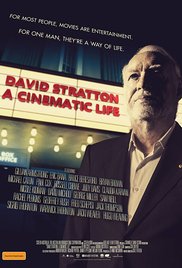
DAVID STRATTON: A CINEMATIC LIFE
Australia, 2017, 105 minutes, Colour.
Directed by Sally Aitken.
What a pleasure!
David Stratton, who came from England in his 20s during the 1960s, made his home in Australia but also made his career home in Australia in cinema. As director of the Sydney Film Festival for almost 2 decades, he would have made his mark with this alone. However, diligent from his childhood in keeping files on all the films he watched, including an early viewing of The Overlanders, writing reviews, he moved into the world of reviewing especially for the American magazine, Variety. He also programmed world cinema screenings for SBS television.
However, this would not have made him a household name. But, his popular collaboration with Margaret Pomeranz on The Movie Show for almost 30 years, first on SBS, then an ABC television, meant that he was an immediately recognisable personality and, a tribute to their success in the programming and their on-screen collaboration as well as sparring, they became an Australian pair who did not need their surnames to be mentioned, they were just David and Margaret.
,
This is a very carefully made film, an opportunity to see something of David Stratton’s biography, his family in England, his father’s war service, his father’s non-comprehension of David’s interest in cinema, a good deal of commentary from David’s brother, David deciding to go to Australia and deciding to stay. There are some photos of David during his Sydney Film Festival era, a bit of a shock for those who did not know him at that stage with his long hair, long beard, moccasins, a far cry from the seemingly fastidious silver haired and bearded gentlemen of later decades (though Margaret has quite a number of shots during this film about how poor she thinks his style and grooming are!).
During this film, David travels in the outback, to a range of Australian locations, admiring and delighting in the beauty of the Australian environment. And illustrating how well the films have capitalised on these environments.
But David Stratton, although he reviewed films from all around the world, has a great admiration for Australian cinema, reminding us that in the 60s there was almost nothing, but there was a breakthrough with such films as Wake in Fright (with extensive clips here), a film he still has on a pedestal.
What he does in this film is to incorporate clips from a great number of Australian films, those he admires, like Muriel’s Wedding, and even those he does not admire, like Brian Trenchard Smith’s Turkey Shoot which he condemns for its ultraviolence (although the film offers Trenchard Smith an opportunity for rebuttal) and Geoffrey Wright’s Romper Stomper, again with interviews with Wright still maintaining his antipathy towards David and the episode of his throwing a glass of white wine over him – and that he would do it again but it would be red!
One of the advantages of having all these clips as well as the continued interviews to camera by David Stratton is that the editor can come and do all kinds of inserts and cuts, sometimes characters in one film answering the dialogue of a character in another – and sometimes, the film character responding to some comments by David Stratton himself. It is an engaging device and treated lightly as the clips moved briskly from one to another.
For those who have lived with the industry since the 1980s, this is a wonderful opportunity to reminisce, to be nostalgic, to be amazed, to admire – for instance the memories of Picnic at Hanging Rock. This means that an Australian audience has much to be proud of, the films, the style, the directors, the actors, a great number of whom are interviewed for this film. It should mean for non-Australian audiences a wonderful introduction to Australian cinema.
Each member of the audience will bring their own experiences – this reviewer (a month older than David Stratton) who has been reviewing since 1968 and has lived through the development, and has met David and Margaret over the last decades, found the experience of watching the film exhilarating, affirming, delightful, and the continued desire to share this appreciation of Australian cinema and be thankful for David Stratton’s contribution.